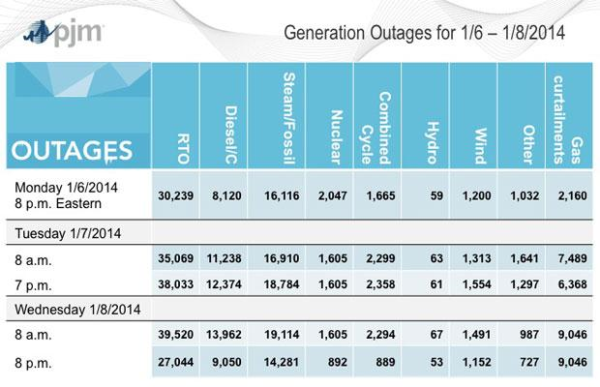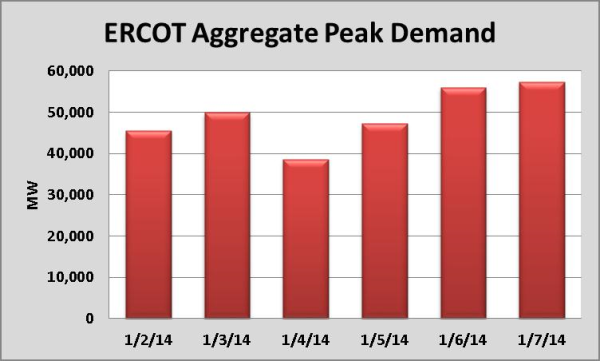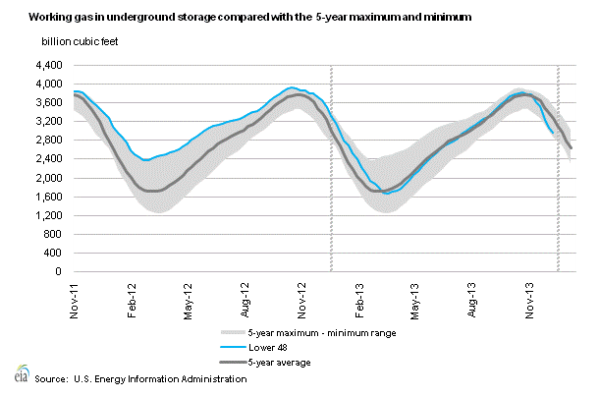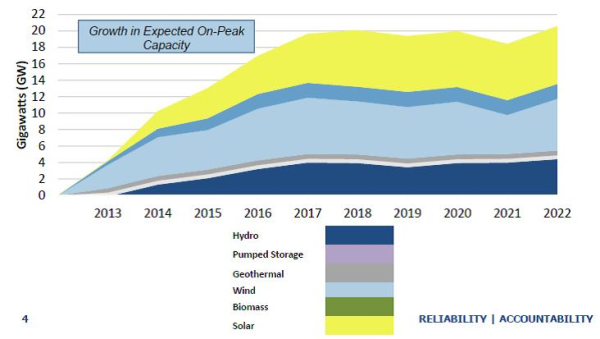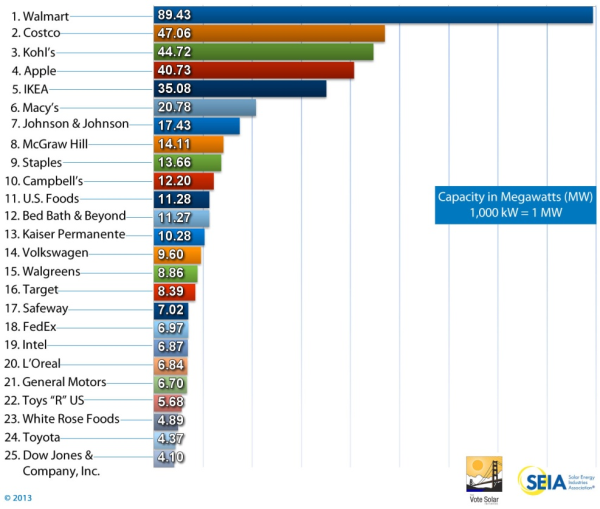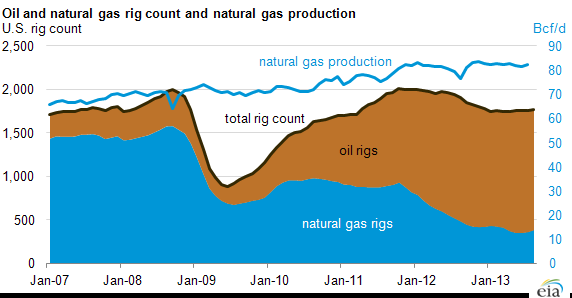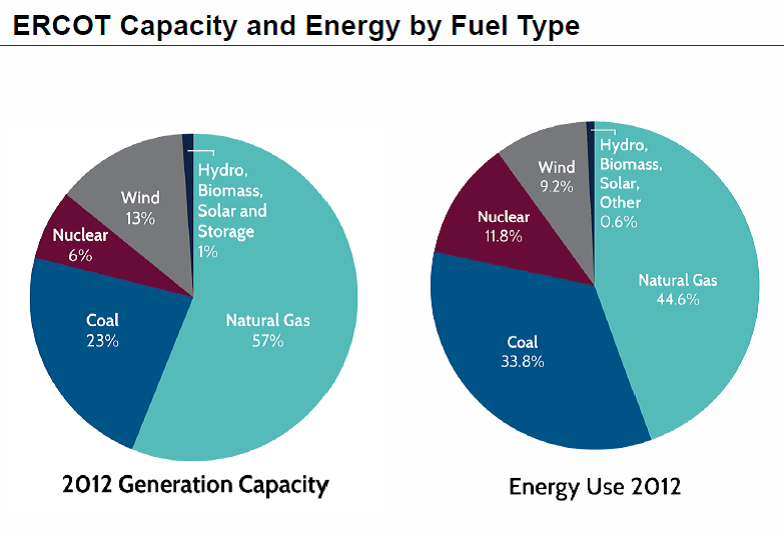PJM is the largest regional transmission organization (RTO) in the U.S. and coordinates wholesale operations in all or parts of Delaware, Illinois, Indiana, Kentucky, Maryland, Michigan, New Jersey, North Carolina, Ohio, Pennsylvania, Tennessee, Virginia, West Virginia and the District of Columbia.
Arctic Blast Shuts Down 20% of PJM's Installed Capacity-Conservation, Demand Response and Power Imports Save the Day
Posted by Jennifer Chang on Jan 12, 2014 10:49:00 AM
Topics: ERCOT, energy risk management, Acclaim Energy Advisors, energy management consulting, risk management, energy, Energy Solutions, energy procurement, weather outlook, reliable energy, energy regulations, energy reliability, PJM, energy savings, energy costs, Weekly Energy Insights, energy management, energy price spikes, energy blog, power outages, Winter Weather, U.S. energy, load generators, RTO
ERCOT Sets New Winter Peak Demand- Real Time Prices Hit $5,000/MWh Cap on January 6, 2014
Posted by Jennifer Chang on Jan 8, 2014 12:59:00 PM
Topics: Heat Rate, REP, ERCOT, Acclaim Energy Advisors, energy management consulting, risk management, energy, Energy Solutions, energy procurement, weather outlook, energy regulations, energy reliability, energy savings, energy costs, Weekly Energy Insights, Event, energy management, energy management consultants, energy price spikes, Price Spike, Winter Weather, U.S. energy, Peak Demand, Emergency
Winter Storm Hercules-Boosts Near-Term Demand for Natural Gas
Posted by Jennifer Chang on Jan 3, 2014 12:59:00 PM
Midwest and Northeast residents have not experienced an arctic blast of this magnitude in more than a decade. The system has moved eastward from Illinois through New England. The all-time record low in Chicago of -11˚F was recorded in 1994 and temperatures on January 6 are expected to be -6˚F, very close to such record. Not only is the storm dumping considerable amounts of snow (5” - 12”), but it is also bringing frigid, below normal temperatures with the coldest air so far this season. Temperatures are expected to be between 20˚F - 40˚F below average in large parts of the continental U.S. through next week. Moreover, sustained 15-50MPh winds are expected, so blizzard warnings have been issued in Cape Code and Long Island. An additional storm behind Hercules will keep temperatures well below normal through early next week.
Topics: energy sourcing, Acclaim Energy Advisors, energy management consulting, risk management, energy, Energy Solutions, energy procurement, weather outlook, reliable energy, energy regulations, energy reliability, energy savings, energy costs, power generation, Weekly Energy Insights, energy management consultants, Texas, dynamic load optimization 365, DLO 365, Winter Weather, U.S. energy, exports
A great deal has been made out of the need to shift away from coal fired power plants and toward renewable energy sources, such as wind and solar in the U.S. While this is certainly a laudable goal, the full impact of a move to renewable power generation has consequences beyond simply reducing emissions and finding alternative power sources. Specifically, determining how to effectively integrate these new power sources, particularly wind and solar, which are highly variable and can go from zero to full production almost instantaneously, pose significant challenges for grid operators.
Topics: system operators, coal, energy risk management, energy sourcing, Acclaim Energy Advisors, risk management, energy, energy procurement, demand response, energy regulations, energy reliability, energy savings, energy costs, power generation, Weekly Energy Insights, natural gas, economic demand response, energy management consultants, strategic energy sourcing, energy price spikes, renewable energy, energy supply, U.S. energy, load generators
The promise of solar energy has been around for decades, but we may be moving past the dawn of the solar age into the early morning hours. With the Obama administration’s desire to move to 20% of all electricity coming from renewable energy by 2020, solar energy is likely to play a key role. Steps are already being taken to make the permit process and the development of solar energy more efficient and less costly. A closer examination of solar energy trends reveals that top corporate users of solar power have deployed over 400MW at nearly 1,000 facilities in 30 states (source: Solar Energy Industries Association).
Topics: energy risk management, Acclaim Energy Advisors, Energy Solutions, energy procurement, reliable energy, energy reliability, energy savings, energy costs, solar energy, solar development, SRECS, power generation, solar industry
Liquified Natural Gas Exports: What This Means for U.S. Consumers
Posted by Jennifer Chang on Nov 22, 2013 11:36:00 AM
The rise of fracking has shifted the U.S. natural gas market at fundamental levels that are not yet fully understood or appreciated. In fact, there is a strong argument to be made that as fracking and other recovery technologies continue to improve, the U.S. will become a major energy provider. By exporting copious amounts of liquefied natural gas (LNG), the U.S. will achieve greater energy independence by cutting back on imports of foreign crude oil products. A massive shift in the global energy markets is neither that far-fetched nor far off and will likely take place over the next decade. As discussed in greater detail below, natural gas has the potential to become a globally traded commodity like crude oil.
Topics: energy risk management, Acclaim Energy Advisors, energy, Energy Solutions, energy procurement, energy regulations, energy reliability, energy savings, Weekly Energy Insights, energy management, exports
Demand Response Is Booming: Are You Leaving Money On The Table?
Posted by Dennis Vegas on Sep 11, 2013 7:05:00 AM
Too often, energy risk management professionals focus on one side of the energy equation, specifically the supply contract. While this is certainly a critical piece of any procurement or strategic energy sourcing approach, it can lead to real value being left on the table for the end user through too much focus on the supply side. A thorough energy risk management strategy will account for the possibility of generating additional revenues through participation in various demand response programs. Of course, the value of those demand response programs will vary based on the type of consumer, their ability to curtail usage, availability of back-up generation and which of the various demand response programs they choose or are able to participate in . With these factors in mind, it is important to evaluate the options for demand response based on each customer’s unique profile.
Basics of Demand Response
Topics: ERCOT, energy risk management, demand response, energy reliability, PJM
Texas PUCT: Will Power Market Structure Shift With New Appointee?
Posted by Dennis Vegas on Sep 9, 2013 7:05:00 AM
On August 21, Governor Rick Perry appointed Brandy Marty to the third seat on the Texas Public Utility Commission that was vacated for six months ago. Ms. Marty, who is an
attorney, has held several positions on Governor Perry’s staff, including chief of staff, deputy chief of staff, and director of Budget, Planning and Policy, among others.
Topics: ERCOT, energy sourcing, demand response, energy reliability, CREZ
Is ERCOT In Trouble? Will Demand Response Improve Reliability
Posted by Dennis Vegas on Aug 1, 2013 3:45:00 PM
At the Texas Public Power Association conference on July 24th, Trip Doggett, the CEO of the Electric Reliability Council of Texas (ERCOT) provided a tremendous amount of information and insight in to the state of the Texas wholesale power market. Some of the key areas he covered included:
Topics: ERCOT, energy risk management, energy management consulting, demand response, energy reliability
Will Texas Energy Reliability Problems Hurt E&P Growth
Posted by Dennis Vegas on Jul 25, 2013 1:00:00 PM
Shale gas exploration and production has been a boom to the energy sector. Suddenly, the U.S. is awash in ample supplies of natural gas and oil. The explosion in energy resources available from shale deposits in the continental U.S. has led the Energy Information Administration to opine that the U.S. could be completely energy self-sufficient in the next 20 years. However, this unexpected expansion of oil and gas exploration and production has stressed the electric transmission systems, especially in areas of West Texas, where the available transmission capacity has not been able to keep up with demand. Electricity usage in West Texas has risen more than 20% since 2009. Therefore, congestion costs increased dramatically. From 2011 to 2012, congestion charges increased ~390% on average.
Topics: ERCOT, energy risk management, demand response, energy reliability


